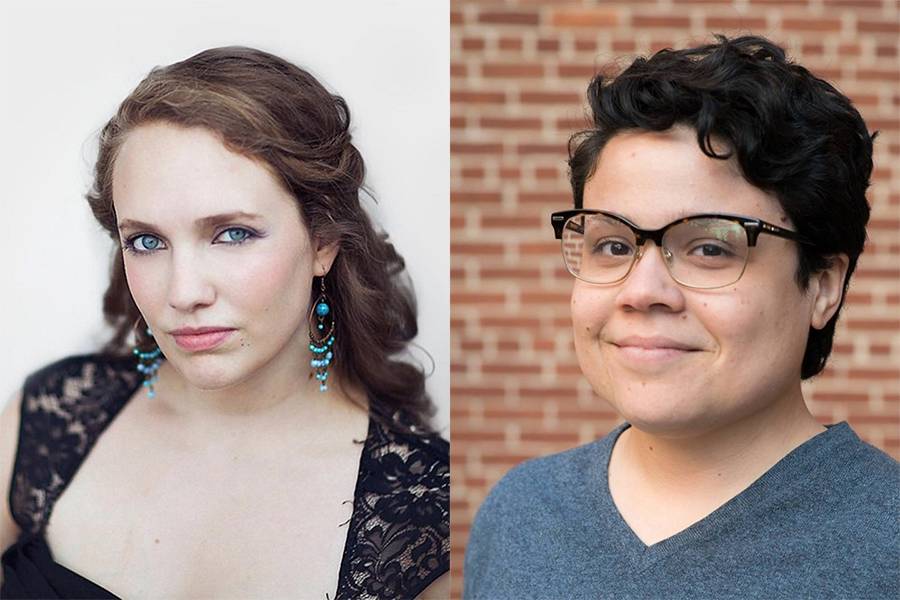Mezzo-soprano Tia Price sang at a family reunion in New Jersey in summer 2017. She performed a piece called "Lullaby" from Stinney, an opera composed by Frances Pollock with a libretto co-written by Pollock and Price when they were vocal performance graduate students at the Peabody Institute. When it premiered in May 2015, Price sang the role of Alma Stinney, the mother of an African-American boy prosecuted by the state of South Carolina in 1944 for the rape and murder of two young white girls. Police said he had confessed, though no record of it exists, and an all-male, all-white jury found him guilty. His name was George. A South Carolina Circuit Court vacated the judgment against him in 2014, 70 years after he was electrocuted. When South Carolina executed him, he was 14.
The reunion where Price sang? The extended-family descendants of the woman she had portrayed onstage. "It was a very emotional experience," she recalls. "I'm getting emotional just thinking about it."
Pollock, Peab '15 (MM), believes opera needs to make its emotive power more accessible. And she thinks that can be done by telling new stories, in new spaces, and involving more diverse composers, performers, musicians, and audiences to broaden opera's reach beyond its perception as a dated, elite, white art form. "If we can figure out how to make opera appealing beyond the upper-class, academically minded group of people that generally goes to the opera there's no reason that opera can't have the same trajectory that American Broadway has had," Pollock says. "We should face the reality that opera needs to speak as widely and broadly as it can."
Video credit: Stinney Opera
Pollock, currently a composition graduate student at the Yale School of Music, is doing her part in this effort. In 2016 she was commissioned by Washington National Opera to write a one-act chamber opera, and in January 2017 her 20-minute "What Gets Kept," about the final day of a terminally ill cancer patient, debuted as part of WNO's exploratory American Opera Initiative Festival. Her latest opera, Salt, for which she composed the music and co-wrote the libretto, is an adaptation of the biblical judgment of Sodom and Gomorrah, dramatizing the tensions between urban and rural communities in contemporary America. In September, scenes from Salt were included as part of the American Opera Projects' Composers & the Voice: Six Scenes 2018 in Brooklyn, which showcased new works of emerging composers.
In January, Pollock's Stinney makes its New York debut as part of the 2019 Prototype: Opera/Theater/Now festival, one of the premier showcases for cutting-edge musical theater and opera in the United States. A large part of the original cast and musicians, culled overwhelmingly from her Peabody classmates, is returning for this staging. And they're revisiting it almost four years later with a better understanding of how the institutional racism explored in the opera persists today. A month before Stinney opened, Freddie Gray was killed while in Baltimore police custody, sparking a series of protests.
Claire Weber, Peab '15 (MM), reprises her role as a mother of one of the young girls killed in Stinney, and recalls how challenging the opera is, musically and theatrically. Stinney is "very violent and really brings out the ugly side of racism in America," Weber says. "Every single time we rehearsed it we all started having discussions that we weren't necessarily comfortable having before. Not much has changed in the country [since 2015] and, perhaps, things have even gotten worse. So I think this story is even more important to tell now. It might open lines of communication to talk about a very difficult subject matter."
Pollock, who is white and grew up in Winston-Salem, North Carolina, felt like she intimately knew the South Carolina context where George Stinney lived—what its people were like, what songs they knew, and the fears, desires, and hatreds they carried in their hearts. "I set out to tell a story that I understood really profoundly because it's a world that I'm from," she says. "I realized through the course of doing this that I was actually telling many people's stories, and how careful I needed to be in doing that."
Price, Peab '14 (MM), appreciated Pollock's desire to portray accurately a small-town America that recalled where she grew up as a mixed-race black woman in West Virginia. "We had conversations trying to get to the root of racism and then having those conversations become characters," Price says. "Honestly, I feel like the characters really were just a byproduct of what we were doing, which was trying to understand how the world had shaped us."
Stinney: An American Execution from PROTOTYPE Festival on Vimeo.
Collaboration, for Pollock, is one way opera can expand both its creative possibilities and potential reach. "I don't just mean collaboration with someone who is a different gender from you or another marginalized voice," she says. "I mean a collaboration with communities who live outside urban centers, who don't have the resources to mount canonic opera. I really want to open [opera] to a place where we can have an exchange of cultural music influences. That type of theater is so powerful, and that type of power is enhanced when you put music behind it."
Artists bring parts of themselves to everything they do, and when those artists are opera composers, musicians, and singers, they're bringing a broader range of human capacity to the art form. Price says her grandmother, who raised her, used to quote a line from a Langston Hughes poem. Price didn't pay much mind to it, as it often came in response to her misbehaving in some way. "I was a hell child, and she would say, 'Life for me ain't been no crystal stair,'" Price recalls. "And I was, like, OK, whatever." Later, Price would read the entirety of Hughes' "Mother to Son" and understand what her grandmother was telling her. "She was saying, 'I have tread that path for you,'" Price says, adding that, as people of color, "You walk with this weight of, I'm carrying the legacy of those that came before me all the time."
Price felt that weight when she sang at the family reunion. "I felt like I was carrying my family into their family space," she says. "And it was a profound spiritual moment, standing there with the people that they had carried in with them. And me, standing there as a representative of everything that my grandma had done—riding a bus three hours each way just to go to the all-black high school in our county—I just sang.
"I sang a lament for her, for the loss she had experienced in her life, for the loss of those that came before her experienced," Price says. "And after I sang, it was the most profound silence I had ever heard."
Posted in Arts+Culture
Tagged opera










